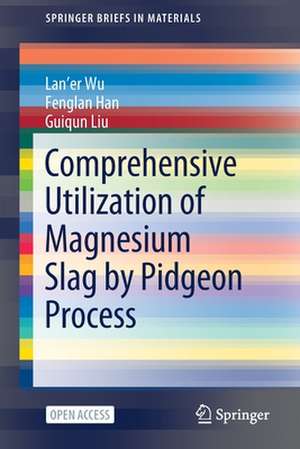Comprehensive Utilization of Magnesium Slag by Pidgeon Process: SpringerBriefs in Materials
Autor Lan'er Wu, Fenglan Han, Guiqun Liuen Limba Engleză Paperback – 30 apr 2021
Din seria SpringerBriefs in Materials
-
 Preț: 315.57 lei
Preț: 315.57 lei -
 Preț: 346.86 lei
Preț: 346.86 lei -
 Preț: 343.98 lei
Preț: 343.98 lei -
 Preț: 344.90 lei
Preț: 344.90 lei -
 Preț: 357.95 lei
Preț: 357.95 lei -
 Preț: 344.90 lei
Preț: 344.90 lei -
 Preț: 344.90 lei
Preț: 344.90 lei -
 Preț: 394.82 lei
Preț: 394.82 lei -
 Preț: 377.18 lei
Preț: 377.18 lei -
 Preț: 375.23 lei
Preț: 375.23 lei -
 Preț: 380.63 lei
Preț: 380.63 lei -
 Preț: 374.46 lei
Preț: 374.46 lei -
 Preț: 378.92 lei
Preț: 378.92 lei -
 Preț: 378.92 lei
Preț: 378.92 lei -
 Preț: 380.07 lei
Preț: 380.07 lei -
 Preț: 377.18 lei
Preț: 377.18 lei -
 Preț: 343.98 lei
Preț: 343.98 lei -
 Preț: 344.21 lei
Preț: 344.21 lei -
 Preț: 377.18 lei
Preț: 377.18 lei -
 Preț: 376.22 lei
Preț: 376.22 lei -
 Preț: 374.85 lei
Preț: 374.85 lei -
 Preț: 412.30 lei
Preț: 412.30 lei -
 Preț: 377.18 lei
Preț: 377.18 lei -
 Preț: 376.22 lei
Preț: 376.22 lei -
 Preț: 374.08 lei
Preț: 374.08 lei -
 Preț: 445.88 lei
Preț: 445.88 lei -
 Preț: 376.80 lei
Preț: 376.80 lei -
 Preț: 385.47 lei
Preț: 385.47 lei -
 Preț: 377.35 lei
Preț: 377.35 lei -
 Preț: 377.18 lei
Preț: 377.18 lei -
 Preț: 375.45 lei
Preț: 375.45 lei -
 Preț: 377.35 lei
Preț: 377.35 lei -
 Preț: 377.73 lei
Preț: 377.73 lei -
 Preț: 380.07 lei
Preț: 380.07 lei -
 Preț: 380.07 lei
Preț: 380.07 lei -
 Preț: 378.71 lei
Preț: 378.71 lei -
 Preț: 412.30 lei
Preț: 412.30 lei -
 Preț: 380.07 lei
Preț: 380.07 lei -
 Preț: 377.18 lei
Preț: 377.18 lei -
 Preț: 378.71 lei
Preț: 378.71 lei -
 Preț: 377.57 lei
Preț: 377.57 lei -
 Preț: 377.18 lei
Preț: 377.18 lei -
 Preț: 442.24 lei
Preț: 442.24 lei -
 Preț: 378.34 lei
Preț: 378.34 lei -
 Preț: 381.00 lei
Preț: 381.00 lei -
 Preț: 373.32 lei
Preț: 373.32 lei -
 Preț: 376.22 lei
Preț: 376.22 lei -
 Preț: 377.95 lei
Preț: 377.95 lei -
 Preț: 376.80 lei
Preț: 376.80 lei -
 Preț: 376.04 lei
Preț: 376.04 lei
Preț: 261.91 lei
Nou
Puncte Express: 393
Preț estimativ în valută:
50.12€ • 52.46$ • 41.71£
50.12€ • 52.46$ • 41.71£
Carte tipărită la comandă
Livrare economică 31 martie-14 aprilie
Preluare comenzi: 021 569.72.76
Specificații
ISBN-13: 9789811621734
ISBN-10: 981162173X
Ilustrații: XI, 141 p. 51 illus., 27 illus. in color.
Dimensiuni: 155 x 235 mm
Greutate: 0.23 kg
Ediția:1st ed. 2021
Editura: Springer Nature Singapore
Colecția Springer
Seria SpringerBriefs in Materials
Locul publicării:Singapore, Singapore
ISBN-10: 981162173X
Ilustrații: XI, 141 p. 51 illus., 27 illus. in color.
Dimensiuni: 155 x 235 mm
Greutate: 0.23 kg
Ediția:1st ed. 2021
Editura: Springer Nature Singapore
Colecția Springer
Seria SpringerBriefs in Materials
Locul publicării:Singapore, Singapore
Cuprins
Introduction.- Magnesium Smelting by Pigeon Process.- Magnesium Reducing Slag.- Harmless Research of Magnesium Slag.- Comprehensive Utilization of Magnesium Slag.
Notă biografică
Professor Lan’er Wu is professor at School of Materials Science and Engineering, North Minzu University of China in Yinchuan, Ningxia Autonomous Region. She focuses on the research of advanced ceramics, especially silicon carbide ceramics, and industrial solid waste recycling. She has published more than 100 academic papers in journals and conferences. Prof. Wu received Ningxia Science & Technology Awards twice (2006,1986), and Outstanding Contributions Award in Ningxia (2007, 2008). She is a member of Chinese Society of Particuology as executive member of the council, and Chinese Mechanical Engineering Society as executive member of the professional board of engineering ceramics.
Professor Fenglan Han is professor at School of Materials Science and Engineering, North Minzu University of China. She graduated from Sichuan University in 1986. Her recent research interests include: Industrial solid waste recycling and chemical analysis. Prof. Han is the head of the International Science and Technology Cooperation Base of North Minzu University. And is also a member of China Association for Analytical Testing as member of a council. She has 11 granted patents, published more than 60 research papers. She received Ningxia Science & Technology Award(2006).
Dr. Guiqun Liu received his doctor’s degree in Institute of Metal Research, Chinese Academy of Sciences in 2014. He majors in the corrosions and Protection of Metal materials and Industrial solid waste recycling. Since Jun. 2014, Dr. Liu has been in School of Materials Science and Engineering, North Minzu University as a Lecturer.
Textul de pe ultima copertă
This open access book introduces the magnesium resources in the world and the layout of this industry, the harmless handling/recycling of magnesium slag, and the process of magnesium silicothermic reduction (Pidgeon process) to produce the slag. Examples and experimental data in this book are from the author group’s research programs, as well as the recent researches in China. The book could provide precious reference to scientists and engineers in the field of recycling and environment friendly use of the industrial solid wastes. It could also be used for researchers and students who are interested in relevant field.
Caracteristici
Provides the latest research results of magnesium slag harmless treatment and recycling in the solid waste field Explains the method of magnesium melting by fluoride-free mineralizers instead of fluorite, which is an innovative discovery of the author’s group. Enriches the book contents with practical examples and experimental processes This book is open access, which means that you have free and unlimited access
